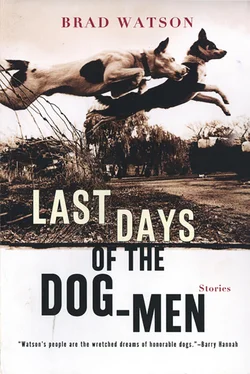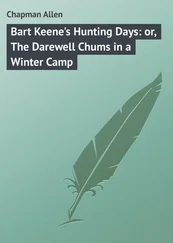The coffee made, she poured a cup, took it out to the porch, and no sooner had her bottom touched the chair than Bob jumped into her lap, circled, and settled in his sphinxlike pose to observe the traffic.
Carolyn Barr and April Ready walked briskly by, swinging their arms like majorettes. They waved, Agnes nodded. The women, in their sixties, had the legs of thirty-year-olds.
“Amazing, Bob,” Agnes muttered. “I bet I know why their old boys kicked off.”
She and Pops had had what she’d considered a normal life, in that regard. Toward the end, Pops got to where he wasn’t interested, and she didn’t mind, much. The truth was, they’d never really gotten over the embarrassment. She’d always figured more sex would’ve been a good thing, but she’d never brought it up with Pops. It seemed frivolous. They’d never talked about sex, never even used the word. She’d always worked, just like him. Forty years! Forty years at the power company for her. He’d kept books at the steam feed works, never retired. A chain-smoker with Coke-bottle-thick glasses, he came home smoking, seemed like steam from the works leaking out of his thick windows onto the world. When he had his attack, he fell into a pile of foundry sand and suffocated.
The day Pops had died, the widow Louella Marshall (a Baptist) had come by. Her husband, Herbert, had been dead for ten years, and since then she hadn’t so much as had coffee with a man. She’d married her church, is what she said. Agnes couldn’t stand her because she seemed so smug, and Agnes couldn’t believe she wasn’t a phony, a religious bully who was scared to death of dying herself, afraid she was going to hell for having secretly wished her bullying husband would die and leave her alone. Agnes wasn’t afraid of going to hell, but when Louella sat in her armchair and made like to comfort her by saying God had taken Pops to be with Him in heaven, she had gotten so angry she took her coffee cup and saucer into the kitchen and dashed them in the sink. She didn’t pretend to have dropped them.
After that, for a while, she frequently had a dream in which she was swimming out in the middle of the ocean, strong as one of those nuts that used to swim across the English Channel. But then there was a roaring sound, and she’d look up and see it was the edge of the world, and a beast would rise up with the body of a dragon and the face of Pops, which then changed into the dog face of Bob, and she awoke in her bedroom where the blue night-light made the damp air seem like water and the breeze through the window sounded like ocean swells and it took her some minutes to calm down and hear Bob down at the foot of her bed, grunting and thrashing in some dream of his own.
She had realized then that she was afraid of dying, and afraid of what had happened to Pops. But she could not be like Louella and believe that this was God’s will, that he had singled out Pops like an assassin. She decided that she would face the possibility of her own death with dignity, by inviting it in, leaving the door unlocked, and that in that way she would be in charge and unafraid. We all know death better than we think, she said to herself.
The only one who’d said anything interesting on that day at her house had been poor Lura Campbell, who had sat tiny and quiet on Agnes’s huge old sofa and sipped her coffee and said, when there’d been a long quiet spell in the room, “I think if I had it to do all over again, after Lester passed away, I’da done some traveling.”
Louella Marshall said, “Well, Lura, where in the world would you’ve gone? To Florida?”
“Oh, I don’t know,” Lura said. “I’da just got into my car and gone.”
Lura and her car.
AGNES DIDN’T SOCIALIZE WITH ANY OF THE WIDOWS. SHE tended the yard and looked after Bob and kept the house fairly clean and watched for rare birds at her feeders. She didn’t see many rare birds, which was natural seeing as how they were rare, but the occasional chickadee or purple finch made it interesting enough.
Warm days, she sunned in her lounge chair on the patio out back, her eyes shut tight against the glare and the heat, talking to Bob the whole time. She could hear him grunting and snuffling and rooting around like a hog. Whenever he was quiet she raised up and looked, to see if anyone had walked up, and then lay back down. She hated sunbathing, but it was good for the psoriasis, and it helped fight her natural pallor, which made her feel like those little cave frogs she’d seen once on a trip to the mountains with Pops. Little red eyes and the rest of them clear as a jellyfish, you could see their little hearts pumping and their veins jumping, like their skins were made of glass.
Sometimes she volunteered to take the little girls next door to the pool. Swimming was good for her, the doctor said, and Agnes had always liked the water. She wasn’t much on the surface, since she was too slim to float, but she liked to be underwater, moving along in steady breaststrokes like a long slow fish. She liked the look of things underwater, the silent and bright world that seemed strange in the way that a dream is, very intimate and distant at the same time.
After a swim, lying in the sun beside the pool was easier than tanning in her buggy backyard with Bob always snorting around. She’d take a brush and brush her wet hair straight back and forget about it. She couldn’t do anything with it anymore, it was getting so thin and frizzy. The gray she didn’t care about. She pretty much let Sherilyn just chop it short and do it up in a little permanent. She got it washed once a week. She knew short hair made her neck look longer, but there wasn’t any way around that. Her good eye was a little smaller than the false one and a little reddened from strain, her nose was a little long, and her back was bent just a little forward because of less than ideal posture. She could see this when she walked past a storefront window and saw her reflection. Now, to boot, her fingers were swollen with a mild arthritis and there were the faded, healed reminders of a few small sores on her arms and legs from the psoriasis. It was a good thing she never cared much about appearances. And after a swim, with her muscles tingling from the exercise, she cared even less.
Nevertheless, a tan seemed to help all of that, and helped create a natural vigor, and in her mind’s eye she sought a dignity in the way she looked and mentally compared herself to a tall gray crane beside a bay or a lake, and she tried to carry herself with that dignity in mind. She walked slowly and deliberately, like a crane, and without thinking kept her eye fixed that way, like they did when they were fishing or just stalking along.
IT WAS A NATURAL COMPARISON, GIVEN HER INTEREST IN birds and the three feeders she kept in her backyard.
“Look at that, Bob,” she’d say. “I believe that’s a towhee pecking around down there.” Bob stared at her, jaws clamped. Then he let his tongue out again and started panting.
She sometimes forgot it was Pops who’d first started watching the birds. Feeding them, anyway. He built the feeders in his shop out in the garage. Then he started to read about them a little, and he’d keep track of when they came and went, and he’d sit with her in the kitchen sipping coffee and looking out at the feeders in the spring and announce their arrivals from Argentina, Paraguay, Brazil, and Venezuela, Peru and Colombia and Costa Rica. “Flown here nonstop from the Yucatan,” he’d say. “Made a little stop down on the coast.”
And he took her down there one time in the season. They put on their sun gear, light long-sleeved shirts and khaki pants and tennis shoes and light socks, broad hats, sunglasses and binoculars. They drove down the beach road to the old fort and camped out for two days on the grounds with a bunch of odd ones who called themselves birders and walked the sandy trails and Pops made notes in a little spiral-bound notebook.
Читать дальше











